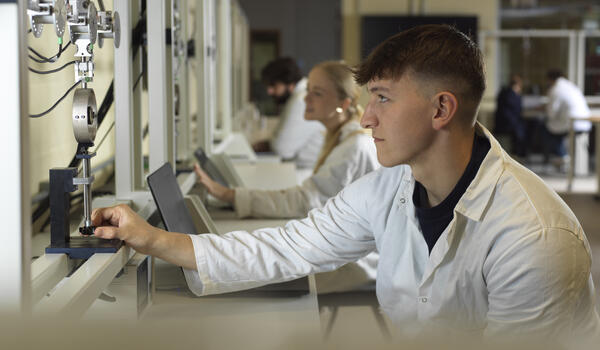This module will allow you to put your Chemical Engineering skills into practice. This design-based module will reinforce principles of mass transfer, mass and energy balances. It will introduce distillation as a separation process based on the principles of mass transfer and lead to the design of a specific unit of process equipment, with a focus on distillation. Working in groups, you will design a distillation column, using computer simulations programs like ASPEN. You will learn the fundamentals of distillation column design, then implement your knowledge to design the column in detail, considering not only technical aspects, but also Legislation, Codes and Standards and costing. At the end of the module, you will write a report and present your design, practicing skills fundamental for professional development.
Understanding how fluids move and how mass is transported is essential in engineering as these principles are applied across various industries, from energy production and manufacturing design to chemical and nuclear plants. In this module, you will explore the nature of fluids and their fundamental properties. You will develop a solid understanding of how fluids behave at rest (fluid mechanics) and in motion (fluid dynamics), and you will test your understanding in the lab. You will also gain insight into mass transfer principles, including molecular diffusion, convective mass transfer, and interfacial transport. These concepts are crucial for designing efficient separation processes, optimising chemical reactions, and developing sustainable engineering solutions.
Throughout your degree you gain a unique skills set based on your understanding of the interdisciplinary nature of sciences. In this module we develop your self-awareness of these skills and how to make the most of graduate-level employment opportunities.
We introduce you to the University’s employability resources including job search techniques and search engine use. We develop your skills in writing CVs and cover letters, and we draw on the expertise of employers and alumni. Your ability to effectively use these resources will enhance your employability skills, your communication skills and help you to develop a short-term career plan.
This lab-based module prepares you for chemical engineering challenges by strengthening your ability to assess risks, operate equipment, and interpret engineering data in a structured and scientific manner. During this module, you will apply fundamental chemical engineering principles to real-world scenarios through hands-on experiments with unit operations. You will learn essential health and safety practices for laboratory and semi-technical scale equipment. You will collect and analyse data, and develop key professional skills, including teamwork, laboratory record-keeping, and scientific report writing. You will gain experience operating lab-scale process equipment safely and effectively while considering health and safety factors. You will also learn to evaluate engineering data, account for uncertainties, and present findings using appropriate statistical and graphical methods. Through writing a technical report and peer presentations, you will develop communication and analytical skills crucial for professional practice.
This module introduces you to the fundamental concepts and practical applications of separation processes based on mass transfer and particulate technology in engineering. You will explore the key concepts that govern both the interaction of the powder with the fluids and the interdependence of mass transfer-based systems that lead to their sequential integration for confidently designing and operating them. Through hands-on experience with industrial practical examples, you will solve problems, including interphase mass transfer, absorption of gases, liquid-liquid extraction and solid-liquid extraction as well as the problems like the particulate processing, motion, packed beds and fluidised beds, equipping you with the skills to design and evaluate them. By the end of the module, you will have developed an advanced understanding of both theoretical and practical aspects of the process design along with the health, safety and environmental considerations, preparing you for modern role of chemical engineers in the chemical process industry.
This module introduces to the fundamentals of chemical reaction engineering, covering key concepts and practical applications essential for designing and analysing reactors. It explores various reaction kinetics, including simple integer and non-integer order reaction rates, and provides an understanding of how to classify reactions based on their characteristics. The course delves into ideal reactor systems and the principles of reactor sizing. The design and evaluation of reactor performance are integrated with energy balance considerations. This module serves as an introduction to homogeneous and heterogeneous systems and provides a comprehensive understanding of the basic reaction engineering principles and their applications.
The module provides an integrated understanding of energy exchange mechanisms in engineering systems, focusing on heat and work transfer across different states and phases of matter. The module emphasises analysing gas and steam systems, refrigeration cycles, heat pump technologies, and reciprocating engines, enabling a competitive edge in shaping the future of sustainable energy solutions. You will understand how to measure and calculate thermodynamic properties for ideal and real fluids, analyse gas and steam systems, evaluate refrigeration and heat pump cycles and master the methods for heat transfer analysis, optimisation of energy processes and systems in consideration of heat transfer, energy conservation and energy availability. You will gain essential problem-solving skills and fundamental knowledge for industrial energy systems analysis and energy-efficient systems design, which is crucial for career development in mechanical, aerospace, and energy engineering.



.jpg)
.jpg)
.jpg)